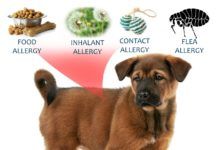Dear Doctor: Not Even One Raisin?
I know youre not supposed to feed your dog any grapes, raisins, onions, or garlic, but is it really true that even one raisin or grape is poisonous? Or one slice of onion or a bit of garlic? I mean, after all, while they say not to feed your dog chocolate, I know anecdotally that a tiny piece of chocolate is not going hurt most dogs.
Dear Doctor: On Whether the Recommended Serving Sizes on Dog Food Labels Account for...
I have read in Your Dog as well as in other places that up to 10 percent of a dogs daily calories can come from treats. With that in mind, when you look at a bag of dog food and see how many cups per day a dog should be fed based on his weight, is the manufacturer taking into account that you might add 10 percent more calories in the form of treats, or is the company calculating 100 percent of a dogs calorie needs? Im asking because Im wondering if I should subtract a little of the kibble recommended so I can add in some goodies each day?
The Gastrointestinal Symptoms Are Probably Not a Food Allergy
While people who suffer from allergies frequently get runny noses, watery eyes, sneezing, and congestion, dogs with allergies often itch. And that itchiness is sometimes accompanied by gastrointestinal symptoms like vomiting or diarrhea. Thus, owners assume their pet has a food allergy. They switch from diet to diet in an attempt to weed out the offending substance thats causing the nasty symptoms, trying grain-free, soy-free, and other types of foods but not really seeing any improvement in their dogs symptoms. Why is that?
Dog Nutrition Websites: The Best of the Best
To help you in your Internet search for reliable nutrition information for your dog, we have compiled a list of the very best websites out there, divided into categories for your convenience.
8 Questions to Ask Before Relying on a Nutrition Website
When you google how to feed a dog with cancer and come upon a website that says to buy your pet a supplement designed by the person running the site, your instinct to feel suspicious kicks in automatically. But when you click on a website that says not to feed your dog a diet with grains because dogs are not naturally grain eaters (and the site points out that you dont see dogs grazing in grassy fields), whether to pay attention can get tougher. (For the record, dogs tolerate grains just fine, and many do like to sometimes munch on grass, which is not a grain, anyway.)
How Come the Weight-Loss Food Has More Calories than My Dogs Regular Food?
You switch your overweight dog from her usual food to one whose label suggests the kibble will help her slim down, yet she doesnt lose an ounce. Maybe she even gains weight on this new food. How can that be? Its because calorie levels for weight management foods for dogs are all over the place, says board-certified veterinary nutritionist Deborah Linder, DVM, who heads the Tufts Obesity Clinic for Animals.
A Quiz About Your Dogs Food Meant to Stump You
Sure, you know to look for the Statement of Nutritional Adequacy in small print on the packages of food you buy your dog so that you are assured it meets the standards of the Association of American Feed Control Officials (AAFCO). But do you have a handle on some of the finer points of dog nutrition? Test your doggie diet acumen.
Considering Digestive Enzyme Supplements
Walk into any large pet food store and youll find no shortage of products called digestive enzyme supplements that are touted with claims like the ones above, which were taken directly from packages retailing anywhere from $11.00 to $17.99 for a 30-day supply. These products tend to be shelved right near the probiotics (and are sometimes bundled together with them in the same products), along with supplements that claim theyll resolve anal gland issues and prevent scooting.
Low-Calorie Treats Will Often Keep Your Dog Just as Happy as Higher-Calorie Snacks
The Head of the Tufts Obesity Clinic for animals, board-certified veterinary nutritionist Deborah Linder, DVM, points out that while people often say they dont mind a fat dog because it just means theres more of their pet to love, that leaves less time to love her. A landmark study that followed dogs for more than a decade found that those who were just 10 to 20 percent overweight - not even obese - lived, on average, almost two years less than their svelte counterparts.
Dear Doctor: Comparing Nutrients from one Good to Another
I read with interest in the February issue your lead article about the Guaranteed Analysis on dog food labels - and came away frustrated that dog food labels will not be like people food labels for the foreseeable future, making it next to impossible to compare nutrient levels in two different dog foods. Is there any way to figure it out, maybe with a formula or something?
Improving Dogs Arthritis Pain With Diet
No dog treat or dietary supplement is allowed to say it actually treats or cures arthritis. That would be a health claim - and a flagrant violation of Food and Drug Administration regulations forbidding health claims on products that havent been proven with clear-cut scientific evidence, meaning research and clinical trials conducted according to strict protocols. Health claims are generally reserved for drugs, not foods or supplements you can get without a prescription.
Decoding One of the Biggest Sources of Confusion on Dog Food Labels: The Guaranteed...
Look at the label on any package of dog food, and the most dizzying part will no doubt be the Guaranteed Analysis, a bunch of numbers given either as percentages or milligrams per kilogram with no accompanying key to explain their meaning in a dogs diet. To make matters more complicated still, each number is listed as a minimum or maximum, so you dont know whether youre getting the least or, conversely, the most allowed. Its very different from the numbers on the Nutrition Facts label for food eaten by people, which gives more practical information that tells the serving size, the calories in that serving size, and what percentage that serving provides of the total amount advised for various nutrients. It also easily allows people to compare apples to apples, so to speak: one jar of tomato sauce to another, one brand of yogurt to another. Why are the numbers on a dog food label so arcane, by contrast?













